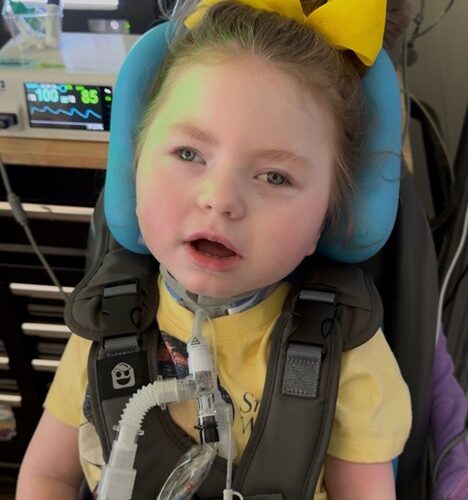Brighton is three years old and will turn four in December. Her mom, Kelly, calls her “our warrior princess” because she is incredibly strong and brings so much happiness to all those around her.
“She is just so full of joy, and anybody who knows her or meets her is captured by that,” Kelly said. “I want everyone to know about Brighton. I think they will fall in love with her the moment they see her smile.”
Brighton has Leigh syndrome, a rare and devastating mitochondrial disease. Doctors once told her parents she would never know who they were, make eye contact, or smile. But Brighton has done all those things and more. “Every little victory where someone said ‘she can’t’ or ‘it will never happen,’ and then it does happen, has been a celebration for our family,” Kelly said.
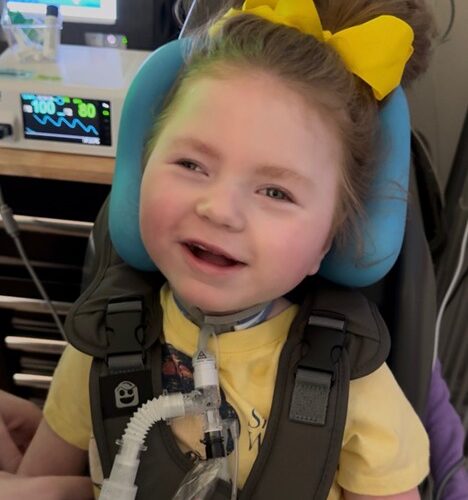
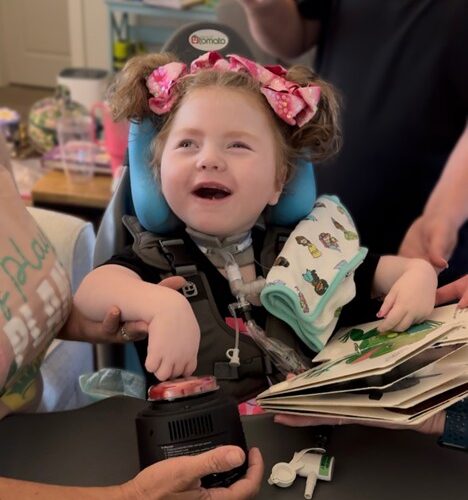
Brighton is nonverbal, but she is very expressive. She communicates with her eyebrows, eye movements, and smiles. She makes choices with her eyes, turning her head toward what she wants. “She is very intelligent,” Kelly explained. “New nurses will ask, ‘How do you know what she’s saying?’ And within weeks they start to see it too.”
Her best friend is her big brother, Sullivan, who is 11. “That’s her person,” Kelly said. “She knows when he’s in the room. She wants his attention. She adores him, and he adores her.”
Some of Brighton’s happiest memories have been made at Walt Disney World, where she lights up at the music, parades, and princesses. “She knows she’s not at a doctor’s appointment,” Kelly said. “She radiates joy there.” She also loves Taylor Swift, Snow White, and Donald Duck.
Brighton’s journey has been filled with challenges most cannot imagine. Around four months old, Kelly noticed Brighton was floppy and delayed compared to other babies. At six months, Brighton wasn’t trying to sit up, so Kelly pushed for early intervention. Soon after, she began having seizure-like episodes and vomiting. Doctors dismissed Kelly’s concerns more than once, but she refused to back down. By nine months, Brighton was admitted to the hospital for failure to thrive. After 20 days of testing, the family received her diagnosis.
“It was devastating,” Kelly said. “It’s an out-of-body experience. You’re trying to retain everything while also having an emotional breakdown. I had Googled her MRI before we even got the results, and I knew it looked like textbook Leigh syndrome. I prayed I was wrong. But when the doctor said the words, I burst into tears.”
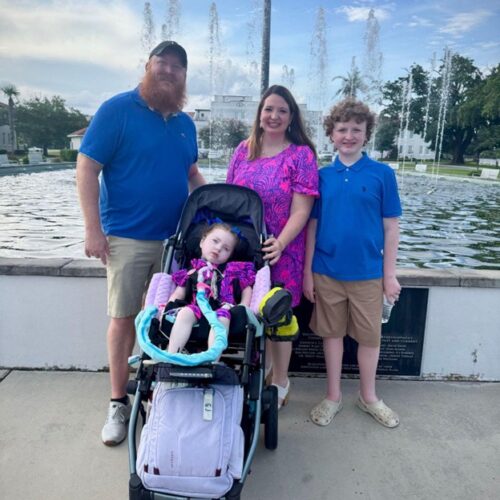
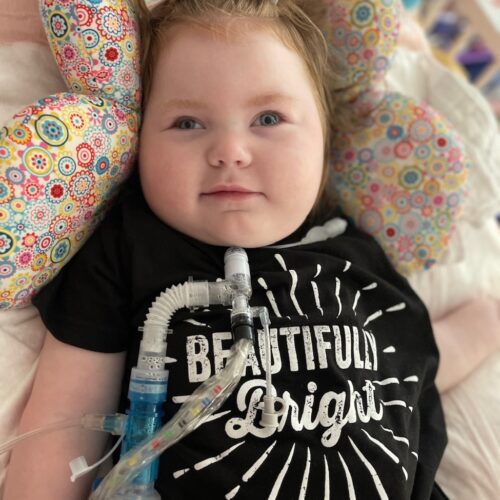
The months that followed were overwhelming. At 10 months, Brighton had a G tube placed. At 11 months, she caught the flu. At 12 months, she went into seizures and never returned to baseline. And at 13 months, she aspirated on vomit. Kelly performed CPR before rushing her to the hospital. There, doctors questioned whether she should even be intubated given her prognosis.
“That was crushing to hear,” Kelly said. “Thankfully, a PICU doctor we had seen before walked by, looked at Brighton, and said, ‘What are you doing? Get her intubated. Get her upstairs.’ She saved her life.”
Brighton now has a GJ tube, trach, and is ventilator-dependent. “I didn’t think I could do medical stuff,” Kelly admitted. “But I’ve learned more than I ever imagined. It’s become our family’s thing. I want to destigmatize it because disability and medical complexity can feel scary. But Brighton is still full of life. She smiles, she jokes, she plays with her brother. That’s what matters.”
Kelly and her husband, Josh, are united in caring for Brighton. “He’s my teammate,” Kelly said. “He was the first to do a trach change. He just jumped right in.” They also have 24/7 nursing support. “Our nurses have become like a second family,” she said. “They’re Team Brighton.”
When asked what advice she would give other newly diagnosed families, Kelly didn’t hesitate. “First and foremost, you are not alone. It feels isolating and overwhelming, but it’s normal to feel that way. You are your child’s biggest advocate. Get organized, track everything, and trust that you know your child best. You will become the leader of their care team, whether you’re ready or not. But you can do this.”
Brighton continues to surpass expectations, and her family celebrates every milestone. She is, as her mom says, a warrior princess—brave, radiant, and deeply loved.
